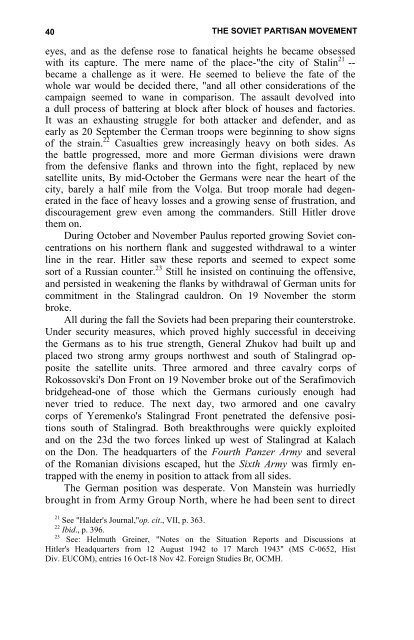the soviet partisan movement 1941-1944 by edgar m. howell
the soviet partisan movement 1941-1944 by edgar m. howell
the soviet partisan movement 1941-1944 by edgar m. howell
You also want an ePaper? Increase the reach of your titles
YUMPU automatically turns print PDFs into web optimized ePapers that Google loves.
40 THE SOVIET PARTISAN MOVEMENT<br />
eyes, and as <strong>the</strong> defense rose to fanatical heights he became obsessed<br />
with its capture. The mere name of <strong>the</strong> place-"<strong>the</strong> city of Stalin 21 --<br />
became a challenge as it were. He seemed to believe <strong>the</strong> fate of <strong>the</strong><br />
whole war would be decided <strong>the</strong>re, "and all o<strong>the</strong>r considerations of <strong>the</strong><br />
campaign seemed to wane in comparison. The assault devolved into<br />
a dull process of battering at block after block of houses and factories.<br />
It was an exhausting struggle for both attacker and defender, and as<br />
early as 20 September <strong>the</strong> Cerman troops were beginning to show signs<br />
of <strong>the</strong> strain. 22 Casualties grew increasingly heavy on both sides. As<br />
<strong>the</strong> battle progressed, more and more German divisions were drawn<br />
from <strong>the</strong> defensive flanks and thrown into <strong>the</strong> fight, replaced <strong>by</strong> new<br />
satellite units, By mid-October <strong>the</strong> Germans were near <strong>the</strong> heart of <strong>the</strong><br />
city, barely a half mile from <strong>the</strong> Volga. But troop morale had degenerated<br />
in <strong>the</strong> face of heavy losses and a growing sense of frustration, and<br />
discouragement grew even among <strong>the</strong> commanders. Still Hitler drove<br />
<strong>the</strong>m on.<br />
During October and November Paulus reported growing Soviet concentrations<br />
on his nor<strong>the</strong>rn flank and suggested withdrawal to a winter<br />
line in <strong>the</strong> rear. Hitler saw <strong>the</strong>se reports and seemed to expect some<br />
sort of a Russian counter. 23 Still he insisted on continuing <strong>the</strong> offensive,<br />
and persisted in weakening <strong>the</strong> flanks <strong>by</strong> withdrawal of German units for<br />
commitment in <strong>the</strong> Stalingrad cauldron. On 19 November <strong>the</strong> storm<br />
broke.<br />
All during <strong>the</strong> fall <strong>the</strong> Soviets had been preparing <strong>the</strong>ir counterstroke.<br />
Under security measures, which proved highly successful in deceiving<br />
<strong>the</strong> Germans as to his true strength, General Zhukov had built up and<br />
placed two strong army groups northwest and south of Stalingrad opposite<br />
<strong>the</strong> satellite units. Three armored and three cavalry corps of<br />
Rokossovski's Don Front on 19 November broke out of <strong>the</strong> Serafimovich<br />
bridgehead-one of those which <strong>the</strong> Germans curiously enough had<br />
never tried to reduce. The next day, two armored and one cavalry<br />
corps of Yeremenko's Stalingrad Front penetrated <strong>the</strong> defensive positions<br />
south of Stalingrad. Both breakthroughs were quickly exploited<br />
and on <strong>the</strong> 23d <strong>the</strong> two forces linked up west of Stalingrad at Kalach<br />
on <strong>the</strong> Don. The headquarters of <strong>the</strong> Fourth Panzer Army and several<br />
of <strong>the</strong> Romanian divisions escaped, hut <strong>the</strong> Sixth Army was firmly entrapped<br />
with <strong>the</strong> enemy in position to attack from all sides.<br />
The German position was desperate. Von Manstein was hurriedly<br />
brought in from Army Group North, where he had been sent to direct<br />
21 See "Halder's Journal,"op. cit., VII, p. 363.<br />
22<br />
Ibid., p. 396.<br />
23<br />
See: Helmuth Greiner, "Notes on <strong>the</strong> Situation Reports and Discussions at<br />
Hitler's Headquarters from 12 August 1942 to 17 March 1943" (MS C-0652, Hist<br />
Div. EUCOM), entries 16 Oct-18 Nov 42. Foreign Studies Br, OCMH.
















